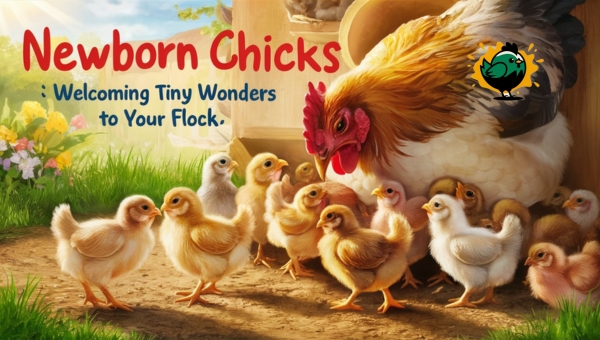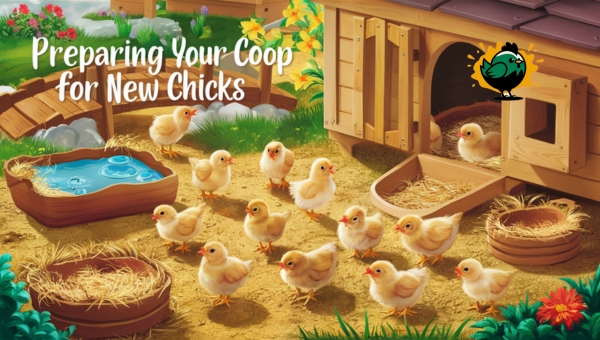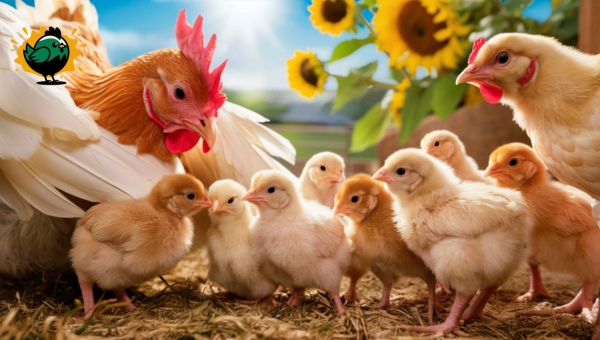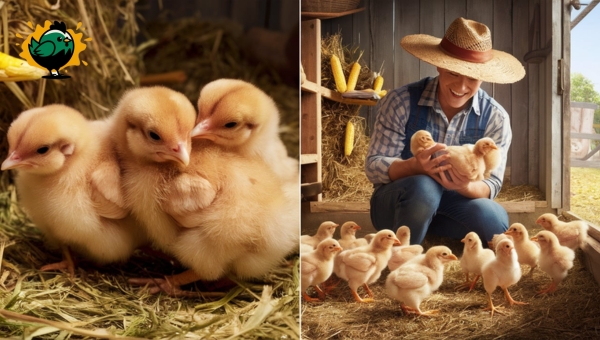Newborn Chicks | Welcoming Tiny Wonders to Your Flock

The soft chirping of newborn chicks fills the air as you step into your backyard. These tiny creatures, full of life and curiosity, are about to become part of your flock. Welcoming newborn chicks is an exciting journey that comes with its own set of challenges and rewards.
As you embark on this adventure, it’s crucial to create a nurturing environment for these young chicks to thrive. From preparing the coop to ensuring their health and safety, each step you take is vital for their growth and development. Let’s delve into the wonderful world of raising chicks and discover how to make their transition seamless.
Preparing Your Coop for New Chicks
Welcoming newborn chicks into your flock is an exciting journey that requires careful preparation. To ensure a smooth transition, it’s essential to focus on creating a safe and comfortable environment.

This includes providing ample space, ensuring security, and setting up a proper brooding area. Let’s explore these steps further.
Ensuring Proper Space and Security
Creating a safe and spacious environment for young chicks is crucial for their well-being. Start by ensuring the coop is predator-proof, with secure locks and barriers to keep unwanted visitors out.
It’s important to provide enough room for the chicks to move freely and explore, which helps promote healthy growth and development. Consider using a separate area within the coop to keep them safe from older birds until they’re ready to join the larger flock.
Setting Up a Brooding Area
A well-prepared brooding area is essential for the proper care of newborn chicks. Here’s what you’ll need to set up an appropriate brooding spot:
- Heat Source: Use a heat lamp or brooder plate to maintain a consistent temperature, as chicks require warmth to thrive.
- Bedding: Provide clean and absorbent bedding, such as straw or wood shavings, to keep the area dry and comfortable.
- Feeder and Waterer: Ensure easy access to fresh water and starter feed, specifically designed for chicks.
- Thermometer: Regularly monitor the temperature to maintain an optimal environment for the chicks.
By addressing these aspects, you’ll be well on your way to providing a nurturing home for your new additions.
Providing Essential Supplies
When welcoming newborn chicks to your flock, it’s important to ensure they have everything they need to thrive. Essential supplies play a crucial role in your chicks’ health and growth.

From food and water to appropriate warmth and lighting, each element is vital for their well-being. Let’s explore these requirements to make sure your young chicks start off on the right foot.
Food and Water Requirements
Newborn chicks require specific nutrition to grow healthily. Here’s what you’ll need to provide:
- Starter Feed: Offer a specialized starter feed with high protein content, typically around 18-20%. This is essential for their rapid growth and development during the initial weeks.
- Fresh Water: Ensure constant access to clean, fresh water. Refill and clean water containers regularly to prevent contamination and promote hydration.
- Grit: Although not immediately necessary, providing grit can aid in digestion as chicks begin to consume more solid foods.
Warmth and Lighting Solutions
Maintaining the right temperature and lighting is crucial for the health of newborn chicks.
Consider the following options:
- Heat Lamp: Use a heat lamp to provide consistent warmth. Position it at a safe distance above the brooding area, adjusting height to maintain a temperature of around 95°F during the first week, then reduce it by 5°F each week.
- Thermometer: Place a thermometer at chick level to monitor temperature accurately. This ensures that the brooding area is neither too hot nor too cold.
- Lighting: Provide a source of light to simulate daylight, encouraging chicks to eat and drink. Ensure the light is not too bright to avoid stress.
By addressing these essential supplies, you set the stage for healthy growth and development in your newborn chicks, ensuring they integrate successfully into your flock.
Also Read: Integrate New Chickens for a Healthier Flock
Introducing Newborn Chicks to the Flock
Welcoming newborn chicks into an existing flock requires careful planning and patience. Proper introduction techniques are vital to ensure a harmonious transition. By understanding these techniques, you can integrate young chicks seamlessly with your adult birds. Let’s explore effective methods and the importance of monitoring interactions.

Gradual Introduction Techniques
Introducing newborn chicks to an established flock should be done gradually to minimize stress and potential conflicts.
Here are some detailed methods to follow:
- Separate Housing: Initially, keep the young chicks in a secure, separate area but within sight of the adult birds. This allows both groups to become familiar with each other without direct contact.
- Barrier Introduction: Use a mesh or wire barrier to allow the chicks and adult birds to see and hear each other without physical interaction. This setup should be maintained for a few days to a week, depending on the flock’s response.
- Short Supervised Visits: Once the birds seem comfortable with each other through the barrier, allow brief supervised interactions in a neutral area. Ensure these sessions are calm and intervene if any aggressive behavior is observed.
- Gradual Increase in Interaction: Slowly increase the duration and frequency of these visits, always monitoring for any signs of aggression or stress among the chicks or adult birds.
- Full Integration: After successful short-term interactions, begin allowing the chicks to spend longer periods with the flock, eventually leading to full integration.
- Observe Pecking Order: Be mindful of the natural pecking order that will establish itself. Some pecking is normal, but excessive aggression should be addressed promptly.
Monitoring Chick and Flock Interaction
Observing the interactions between newborn chicks and adult birds is crucial to ensure a smooth integration.
Here are key points to consider:
- Behavioral Observation: Watch for signs of stress or aggression among the chicks, such as feather pecking or repeated chasing. These behaviors indicate that adjustments may be necessary.
- Health Monitoring: Ensure that the chicks are not being excluded from food and water sources by the older birds. Proper access is vital for their growth and development.
- Consistent Supervision: During the initial days of full integration, maintain a close watch on the flock to address any issues quickly.
- Adjustment Period: Understand that it may take some time for the flock to adjust to the new members. Patience and consistent monitoring will support a successful integration.
By following these steps, you can facilitate a positive introduction for your newborn chicks, ensuring their safety and well-being within the existing flock.
Health and Safety Measures
Welcoming newborn chicks into your flock is an exciting time, yet it requires diligence to keep them healthy and safe. A key part of raising young chicks is understanding their health needs and ensuring their environment is secure. Let’s explore how to recognize signs of illness in chicks and maintain a clean coop for their well-being.

Recognizing Signs of Illness
Identifying illness in newborn chicks early is essential to their survival and growth.
Here are some common signs to watch out for:
- Lethargy: If a chick is unusually inactive or not moving much, it may be a sign of illness.
- Loss of Appetite: Chicks that refuse to eat or drink should be monitored closely, as this can indicate underlying health issues.
- Respiratory Issues: Wheezing, coughing, or labored breathing are clear signs that a chick might be suffering from a respiratory problem.
- Diarrhea: This can lead to dehydration and is often a symptom of infection or dietary issues.
- Abnormal Droppings: Changes in the color, consistency, or frequency of droppings can signal health concerns.
- Swelling or Discoloration: Check for any unusual swelling or color changes in the eyes, legs, or beak.
Addressing these symptoms promptly by consulting a veterinarian or an experienced poultry keeper is crucial to prevent the spread of disease.
Keeping the Coop Clean
Maintaining a clean environment is vital for the health of your chicks. Here are some best practices to ensure your coop remains sanitary:
- Regular Cleaning: Clean the coop at least once a week by removing waste and replacing bedding.
- Ventilation: Ensure proper airflow to prevent moisture build-up and reduce the risk of respiratory issues.
- Sanitization: Disinfect feeders and water containers regularly to prevent the growth of harmful bacteria.
- Pest Control: Keep the area free from pests like mites and rodents, which can carry diseases.
- Fresh Bedding: Use clean, dry bedding materials to provide a comfortable and hygienic space for the chicks.
- Waste Management: Dispose of waste properly to avoid attracting flies and other pests.
By adhering to these practices, you can create a healthy environment that supports the growth and development of your newborn chicks.
Also Read: Food for Newborn Chicks | Revealed the Best Nutrition
Encouraging Growth and Development
When welcoming newborn chicks to your flock, ensuring they grow and develop properly is crucial. Growth and development involve more than just providing food and shelter; it’s about nurturing their physical and social needs. Let’s explore the fundamentals of proper nutrition and social behavior to ensure your young chicks thrive.
Providing Proper Nutrition
To support the growth of newborn chicks, offering a balanced diet is essential. Here’s what you need to consider:
- Starter Feed: Begin with a high-quality starter feed that is rich in protein. This helps with muscle and feather development.
- Clean Water: Always ensure fresh water is available. Hydration is vital for digestion and overall health.
- Supplements: Consider adding vitamins and minerals if your feed lacks these nutrients. This provides a well-rounded diet.
- Gradual Transition: As chicks grow, gradually introduce grower feed to meet their changing nutritional needs.
Supporting Socialization and Behavior
Social development is as important as physical growth. Encouraging healthy social behavior in young chicks helps them integrate well into the flock. Here’s how:
- Group Living: Raise chicks in groups to encourage social interaction and bonding.
- Gentle Handling: Regularly handle chicks gently to make them comfortable with human presence.
- Observation: Spend time observing chick interactions to spot any signs of social stress.
- Enrichment: Provide toys or perches to stimulate their curiosity and promote active behavior.
By focusing on these aspects, you can help your chicks grow into healthy and socially adept members of your flock.
FAQs
What is the best environment for newborn chicks?
Newborn chicks need a safe, spacious environment with proper ventilation. Ensure the area is secure from predators and has enough room for them to move around comfortably.
How should I set up a brooding area for young chicks?
A brooding area should include a heat source, clean bedding, and easy access to food and water. The temperature should be consistently warm to keep the chicks comfortable.
What are the essential food and water needs for newborn chicks?
Chicks require a starter feed that is specifically formulated for their growth. Clean, fresh water should always be available to help them stay hydrated.
What should I look for to recognize signs of illness in chicks?
Watch for symptoms like lethargy, loss of appetite, and unusual droppings. If you notice these signs, consult a veterinarian for advice on proper care.
Conclusion
Welcoming newborn chicks into your flock is an exciting adventure that brings joy and energy to your coop. By ensuring a safe environment, providing essential supplies, and monitoring their integration with existing birds, you set the stage for healthy growth and harmonious interactions.
Paying attention to health measures and fostering social behavior are crucial steps in raising confident and robust chicks. Remember, each step you take helps pave the way for a thriving flock.
If you found this guide helpful, explore more insightful articles on our site to continue your journey in poultry care and management. Your flock deserves the best, and we’re here to support you every step of the way!
